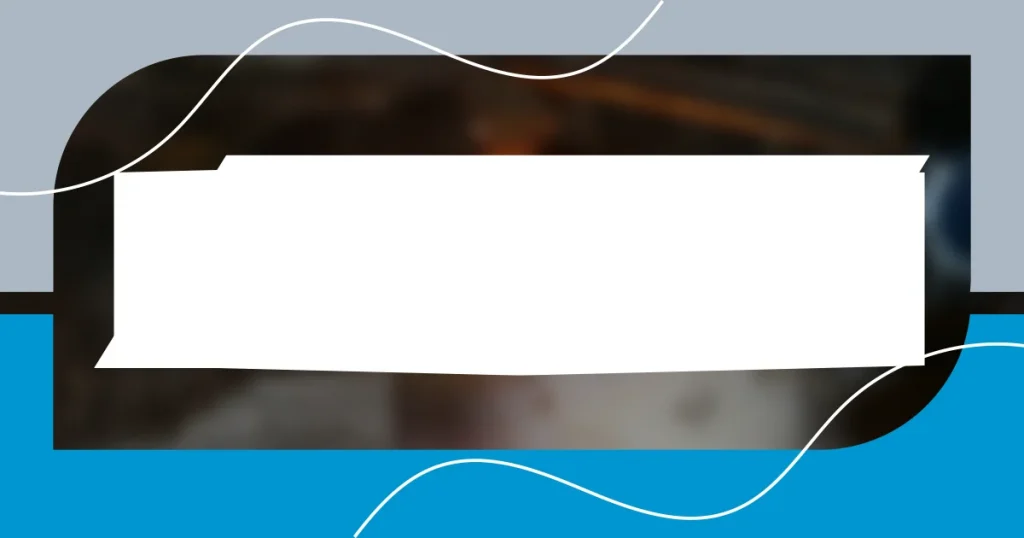Key takeaways:
- Transitioning to renewable energy significantly reduces greenhouse gas emissions and fosters energy independence, benefiting both the environment and household finances.
- Engaging with community members through workshops and discussions creates a supportive network that enhances advocacy efforts and encourages collective action.
- Measuring advocacy impact involves tracking both digital engagement and personal stories, highlighting the importance of relationships and transformative moments in community outreach.

Understanding renewable energy benefits
One of the most compelling benefits of renewable energy is its capacity to drastically reduce greenhouse gas emissions. I’ve seen firsthand how communities transitioning to solar power not only decrease their carbon footprints but also inspire others to take similar steps. Isn’t it gratifying to think that our choices today can lead to a cleaner, healthier planet for future generations?
Moreover, renewable energy can often spell financial relief for households. When my neighbors installed wind turbines, their energy bills dropped significantly, which allowed them to invest more in family activities rather than utility costs. Have you ever thought about how your energy choices could directly impact your wallet while also benefiting the environment?
Beyond the economic and environmental advantages, renewable energy fosters energy independence. I remember a community meeting where residents shared stories of how local solar farms freed them from reliance on distant, sometimes unstable energy sources. Isn’t there something empowering about taking charge of your energy future? The sense of autonomy and resilience that comes from harnessing natural resources is truly profound.

Identifying your advocacy goals
Identifying your advocacy goals is crucial in making a meaningful impact. I often recommend starting with the specific changes you want to see in your community or beyond. For instance, I once set a goal to increase the awareness of solar energy benefits in my neighborhood. After organizing a small educational workshop, I saw a genuine interest from attendees who were eager to learn—this moment confirmed for me the power of targeted advocacy.
Here are some questions to consider when defining your advocacy goals:
– What specific outcomes do I want to achieve?
– Who is my audience, and how can I engage them effectively?
– What resources and partnerships can I leverage to amplify my voice?
– How will I measure the success of my efforts?
Reflecting on these points helped me shape my approach and align my passion for renewable energy with tangible objectives. In my experience, the clearer your goals, the more focused and effective your advocacy will be.

Building a supportive community
Building a supportive community around renewable energy is essential to driving meaningful change. I found that engaging my neighbors in discussions about sustainability created a sense of camaraderie. There’s a real magic in sharing experiences and ideas; it fosters a collective spirit that motivates everyone to take action together.
One powerful moment for me was during a neighborhood event where we collaborated on a tree-planting project. As we exchanged stories about our individual journeys toward adopting cleaner energy practices, it became clear that support breeds more support. Have you ever noticed how enthusiasm is contagious? That day, many expressed their desire to explore solar energy options, igniting a wave of interest that carried on long after.
Building a community is also about creating accessible platforms for sharing knowledge. I’ve been part of a local social media group where people can share tips about renewable energy, ask questions, and brainstorm ideas. The empowering feeling of knowing that we’re all learning from one another and growing together is incredibly fulfilling. It’s a reminder that when we band together, we can amplify our efforts and make lasting changes.
| Aspect | Individual Action | Building Community |
|---|---|---|
| Motivation | Can be isolated and dependent on personal values | Fosters shared enthusiasm and collective goals |
| Resources | Limited to personal networks and knowledge | Expands access to diverse expertise and support |
| Impact | Reduces personal carbon footprint | Amplifies efforts, leading to widespread community change |

Engaging with local policymakers
Engaging with local policymakers is a pivotal step in the renewable energy advocacy journey. I remember attending a city council meeting, feeling a mix of excitement and nerves. As I presented my ideas on community solar projects, the genuine interest from some council members reassured me that grassroots advocacy could resonate at higher levels of governance. Have you ever felt that rush when your passion aligns with someone else’s goals? It’s electrifying and empowering!
Building relationships with policymakers isn’t just about formal presentations; it’s also about genuine conversations. One afternoon, I invited a local representative for coffee to discuss the potential of wind energy in our area. What started as a simple chat turned into a deeper discussion about the community’s needs and aspirations. I found that listening to their concerns about budget constraints opened new avenues for presenting renewable energy solutions that fit their agenda. This makes me wonder—how often do we forget the human aspect of advocacy?
I also discovered the power of follow-up and persistence. After successfully advocating for a renewable initiative, I sent a personalized thank-you note to the policymakers involved, highlighting their role in this essential change. It not only built rapport but also kept the conversation alive for future projects. How important do you think it is to nurture these relationships over time? In my experience, it’s crucial; advocacy is not a one-off event but a continuous dialogue that can lead to lasting impact.

Utilizing social media platforms
Utilizing social media platforms to advocate for renewable energy has been a revelation for me. I remember one particular Facebook live session where I shared my excitement about a community solar project. The interaction was electric! Viewers asked questions, shared their thoughts, and I could feel the energy of dialogue sparking new ideas. Is there anything more rewarding than seeing online interactions translate into real-world interest?
I also find that social media allows advocacy to reach a broader audience. I’ve been involved in Twitter campaigns promoting local renewable energy events, and it’s truly amazing how a simple tweet can garner interest and participation. I once tweeted about an upcoming clean energy expo, and to my surprise, it went viral within our community. Could a hashtag really be powerful enough to inspire action? My experience says yes!
The beauty of these platforms is that they offer a space for storytelling. I’ve had people reach out to share their renewable energy experiences, and we’ve created a rich tapestry of shared narratives. I can’t help but feel that when we put a face to renewable energy challenges and successes, it becomes so much more relatable. Isn’t it fascinating how a story can engage hearts and minds in ways that statistics alone cannot?

Hosting educational workshops
Hosting educational workshops has been one of my most fulfilling advocacy efforts. I recall organizing a small workshop in my garage, gathered around a whiteboard with neighbors eager to learn about solar panel installations. The energy in the room was contagious; everyone was curious and engaged. Isn’t it incredible how sharing knowledge can spark a community’s interest in renewable energy?
One memorable moment was when an attendee expressed her anxiety about the upfront costs of solar energy. Instead of just addressing her concern, I encouraged an open discussion, inviting others to share their financial experiences and solutions. The collaborative atmosphere not only empowered her but also created a supportive network eager to explore funding options together. This makes me wonder: how often do we underestimate the power of community in overcoming barriers?
I’ve since expanded these workshops to include local experts, adding valuable perspectives. During a recent session, one speaker shared her journey of transitioning to renewable energy in her home. Her passionate storytelling captivated the audience, reminding me of the profound impact personal narratives can have. It’s moments like these that deepen my belief that education and storytelling are essential tools in inspiring change—don’t you agree?

Measuring advocacy impact and success
Measuring the impact of my advocacy for renewable energy isn’t always straightforward, but I’ve found some methods that resonate with me. For instance, I like to track engagement metrics from my social media campaigns, like shares and comments. I remember when I posted a video detailing my solar panel installation journey—seeing the comments roll in from others who were inspired to take similar steps was exhilarating! How cool is it that digital connections can lead to real changes in our communities?
Another metric I’ve considered is community involvement in local events. After hosting a renewable energy fair, I collected feedback through simple surveys. One insightful response came from a participant who shared that attending our event motivated her to consider electric vehicle options. This feedback taught me that measuring impact isn’t just about numbers; it’s about those transformative moments that inspire action. It makes me wonder how many small yet significant shifts happen behind the scenes as we engage our communities.
Lastly, I also gauge success through the conversations I have over coffee or during casual meetups. Just the other day, I chatted with a friend who went solar after my workshop last year. Hearing how she’s not only saving on energy bills but also feeling part of a larger movement was incredibly validating. This kind of anecdotal evidence enriches my understanding of advocacy’s impact in a way that hard data sometimes can’t capture. Isn’t it amazing how personal stories can reveal the true depth of our collective journey toward a sustainable future?
















